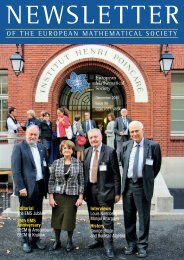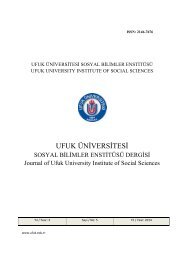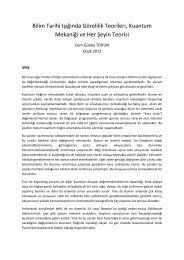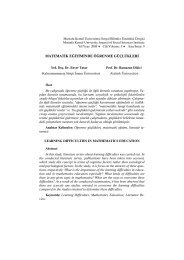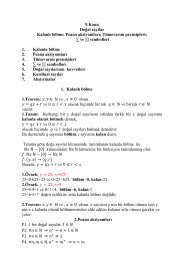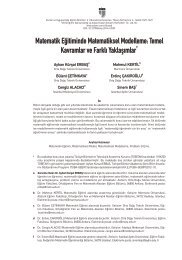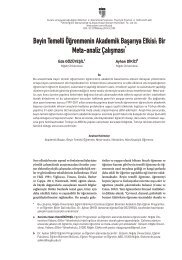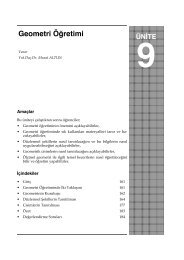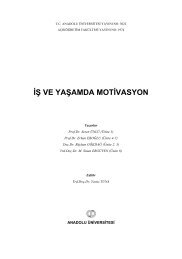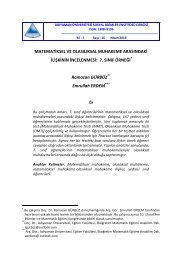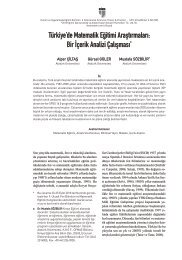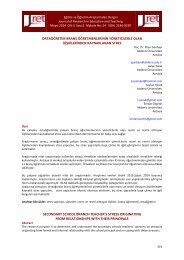bd798f7e557c386e7e231ced888acec57061
bd798f7e557c386e7e231ced888acec57061
bd798f7e557c386e7e231ced888acec57061
- No tags were found...
You also want an ePaper? Increase the reach of your titles
YUMPU automatically turns print PDFs into web optimized ePapers that Google loves.
EDUCATIONAL SCIENCES: THEORY & PRACTICE<br />
tives, and intervene in unfavorable circumstances.<br />
When the interviews and field notes are evaluated<br />
holistically, it can be asserted that the value “productivity”<br />
lies behind these attitudes. To exemplify<br />
the value “authority”, some parts of an interview are<br />
given below:<br />
Similar to T5, G12 valued absolutism in her/his<br />
decision making process in group studies. When<br />
G12 were asked whether s/he considered gender<br />
differences while forming groups, s/he responded<br />
as “I do not tolerate such demands. Students have<br />
to learn to study with others, which should be independent<br />
from gender.”<br />
G10 works at a secondary school (Gymnasium) as<br />
a mathematics teacher and has a 12-year-teaching<br />
experience. Her/his second major is sports. S/he<br />
behaved calmly and determinedly during the interview.<br />
In a group study, G10 reported that s/he<br />
first searched for the reasons behind students’ objection<br />
to group formation and decide accordingly.<br />
The quotations taken from the interview of G10 is<br />
provided below:<br />
M: Suppose that you would like to do group work.<br />
But, some students protest against with the demand<br />
of individual learning. What would you do<br />
in such a situation<br />
G10: It depends on the situation and the student.<br />
I ask the student “Why don’t you want to work in<br />
groups” First, I take the student out of the classroom<br />
and try to compromise with her/him. But,<br />
if her/his problem cannot be solved,… [taught] it<br />
depends on the situation.<br />
Gender Differences<br />
This category could have been placed in the category<br />
of socialization/societal values. Yet, it was<br />
handled as an independent category since German<br />
mathematics teachers had particular and different<br />
attitudes towards gender differences from their<br />
Turkish colleagues. In this study, gender was considered<br />
in terms of the definitions of TDK (1998)<br />
“special biological characteristics which define<br />
humans as female or male and attribute different<br />
roles to them in progeneration” (p. 411) and WDW<br />
(2006) “Überbewertung der geschlechtlichen Unterschiede”<br />
(p. 1353).<br />
Regarding the category of gender differences,<br />
teachers’ views change depending on the country.<br />
When Turkish teachers were asked whether<br />
they considered gender differences while forming<br />
groups, it was observed that all (except for T3) gave<br />
priority to the value “productivity” and they did not<br />
voice any opinions related to gender differences. As<br />
for German teachers, it was found out that most<br />
of them (90%) expressed different opinions from<br />
their Turkish colleagues and their opinions directly<br />
focused on gender differences. The values spoken<br />
out by German teachers in relation to this category<br />
were esthetics, beauty, neatness, and gender-based<br />
collaboration. For instance, G6 said “I pay attention<br />
to gender distribution across groups, I form<br />
mixed groups. Girls draw, write better in group<br />
studies” and, as T3 do, indicated that such values<br />
as esthetics, beauty, and neatness belonged to girls.<br />
Discussion<br />
In this section, the underlying values of Turkish<br />
and German Mathematics teachers’ decision making<br />
processes (in group studies) will be discussed<br />
in terms of their similarities and differences. While<br />
doing this, Lim and Ernest’s (1997) category of values<br />
taught in mathematics lessons, Bishop’s (1996)<br />
category of mathematical values, and Hofstede’s<br />
(1980, 2009) category of cultural values will be taken<br />
into account. Also, recommendations for education<br />
of mathematics teachers and further studies<br />
will be provided.<br />
Similarities and Differences in the Category of<br />
Values Taught in Mathematics Lessons<br />
In the end of the present study, the underlying values<br />
of the Turkish teachers’ decision making processes<br />
were categorized under three main headings<br />
whereas those of German teachers were categorized<br />
under four main headings. The first three values<br />
could be handled commonly although their subcategories<br />
differ according to the countries. However,<br />
it was concluded that the fourth value (gender<br />
differences) was more important to German mathematics<br />
teachers. Moreover, two of these values<br />
(productivity and flexibility/authority) can be considered<br />
within the category of values in mathematics<br />
education while the other two (socialization<br />
and gender differences) can be addressed in the<br />
category of societal and cultural values. The values<br />
productivity and flexibility/authority were prominent<br />
in decision-making processes of both groups<br />
of teachers (in group studies). But, when each category<br />
was examined in detailed, certain differences<br />
were observed in their sub-categories. Within the<br />
scope of the definition adopted in this study, it was<br />
found out that the value productivity was process<br />
and product-oriented and it included two sub-values<br />
as student and leaning environment-oriented.<br />
700




